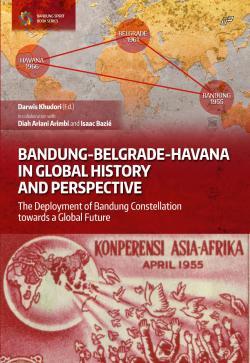BANDUNG-BELGRADE-HAVANA IN GLOBAL HISTORY AND PERSPECTIVE: THE DEPLOYMENT OF BANDUNG CONSTELLATION TOWARDS A SHARED GLOBAL FUTURE
Synopsis
We are living in a global world where one incident in one place, one
country may deeply affect other places, other countries. The COVID-19
pandemic has shown us that we are living in a time where no man is an
island as written by an English poet John Donne published in 1624:
No man is an island entire of itself; every man
is a piece of the continent, a part of the main;
if a clod be washed away by the sea, Europe
is the less, as well as if a promontory were, as
well as any manner of thy friends or of thine
own were; any man’s death diminishes me,
because I am involved in mankind.
And therefore never send to know for whom
the bell tolls; it tolls for thee.
Today, we are so connected that the word “globalization” is ubiquitous.
We are all citizens of the world.
Throughout history, adventurers, generals, merchants, and financiers
have constructed an ever-more-global economy or what we call now
globalization. Today, rapid changes in communications, transportation,
and information and computer technology (ICT) have given the process
new impetus. Globalization creates new markets and wealth, even as it
causes widespread suffering, disorder, and unrest. It is both a source of
repression and a catalyst for global movements for equality and social
justice.
Technology has now created the possibility and even the likelihood of
a global culture. The internet of things, satellites, and smart hand-phones
(mobiles) are sweeping away cultural boundaries. Global entertainment
companies shape the perceptions and dreams of ordinary citizens,
wherever they live. This spread of values, norms, and culture tends to
promote Western ideals of capitalism. The questions such as, “will local
cultures inevitably fall victim to this global “consumer” culture? Will consumer values overwhelm peoples’ sense of community and social
solidarity? Or, on the contrary, will a common future lead the way to
greater shared values and political/social unity?” are now engrafted in
our minds.
Globalization indeed expands and accelerates the movement and
exchange of ideas and commodities over vast distances. It is common
to discuss the phenomenon from an abstract, global perspective,
unfortunately, however, globalization’s most important impacts are
often highly localized. Globalization does not agreeably stop at some
ill-defined frontier between economics, society and culture. Indeed, it has
its own set of cultural attendants, which exercise a profound influence
on the life of people everywhere.
It is considerably insincere to assume that economy, society and
culture operate in separate spheres. Indeed, how geographical entities
are now designated shows the increasing balkanization of these notions.
An advanced economy, an industrialized nation, or a mature economy is
set against a developing country, an emerging market, or a liberalizing
society. The terms are almost interchangeable. This suggests that once
exposed to the globalizing necessity, no aspect of social life, customary
practice, or traditional behaviour will remain the same. In reality, it is
definitely not so.
Globalization is not a once-and-for-all fixed term. It is problematic
as it still shows two opposite faces: its advantages and disadvantages.
How about globalization in societies around the world? How do people
respond and resist it? How do cultures, societies or communities react to
globalization? Hopefully, we can find possible answers to these intriguing
questions in this edited volume.
Downloads








